Dear community,
To close out National Minority Mental Health Awareness Month, we have a special conversation for you — with Dr Ahmed Hankir, a Lebanese-British-Irish psychiatrist with deep lived experience.
💫 Spread the light with Dr Devika B. First-person accounts of living with mental illness that dispel stigma and stereotypes and instead, spread hope and light — also a YouTube channel and podcast on Apple and Spotify
Because stigma festers in the dark and scatters in the light
We don’t talk enough about the traumatic health impacts of migration and assimilation — the reasons that brought us to that point, like war or civil unrest; being wrenched from loved ones; contending with foreign systems; poverty; racism; and discrimination. These experiences can leave a huge imprint on health, opportunity, and well-being.
My conversation with Dr Hankir, who migrated to the UK from Lebanon at age 17, ranged from the trauma of leaving loved ones behind in Lebanon to the terror of witnessing bombings there from afar, to his experiences as an immigrant, to the role of faith, storytelling, and movement in his own healing, to using empathy as a recovery tool for his patients.
Dr Ahmed Hankir is a Lebanese-British-Irish psychiatrist with expertise by lived experience. He serves as the Lead for Public Engagement and Education at the World Health Organization (WHO) Collaborating Centre for Mental Health and Human Rights, Institute of Mental Health, Nottingham University, UK. Dr Hankir is passionate about empowering and dignifying people living with mental health conditions and is the creator of the mental health-focused performing arts piece, The Wounded Healer.
Trigger warning: In this interview, we talk about war, suicidality, depression, witnessing violence and homicide, racism, Islamophobia, and classism.
Above, you’ll find the audio recording of the podcast episode and below, a transcript. The written version of the conversation has been lightly edited for clarity and length.
If you’d prefer to watch this conversation, please click here.
Click here to catch up on other Spread the light columns, in addition to any other posts organized by column type, going back to our newsletter’s launch in January 2023.
If you or a loved one needs help for a mental health crisis, don’t hesitate to call or text 988 — or reach them online here. Find other resources here, search for a US treatment facility here, and find a US-based therapist here.
If you’re a US-based clinician or health student dealing with “any issue, not just a crisis” — reach out to the Physicians Support Line, free of cost and confidentially: 888-409-0141 (M-F, 8 am to 12 am ET).
Wishing you light,
Dr Devika Bhushan
DB: Can you tell us about leaving Lebanon when you were 17, and also about how your mental health journey began?
AH: When I left my parents behind me in Lebanon — I'll never forget the date, the 10th of July, 2000.
And I must say that many people who do migrate or who do seek refuge don't do so because they want to, but because they have no other choice.
And certainly that felt like the case for me. My mother was crying inconsolably — my father was looking very serious and somber. I'm sure [they’re] still processing the trauma to this day.
It just felt like I had no other choice. The situation back then over there was terrible. More than 60, 70% of the population was living below the poverty line. And prospects were not looking too good.
So I packed my bags and I arrived in England — and I was 17 years old. My mind was still maturing, my brain was still developing, my heart was still growing.
I was naive — quite clueless. I thought that money grows in trees. I thought that we would just waltz into medical school. It was always my dream to become a doctor.
I graduated top of the class and I thought we would be kind of welcomed with arms wide open and they would embrace us.
But the reality was very different. My qualifications from Lebanon were not recognized and I had to survive.
My first job: I was working in a van, selling burgers and kebabs with a refugee, an asylum seeker, from Chechnya.
And that was when I witnessed my first homicide. ‘Welcome to the UK.’ A bunch of younger men, intoxicated, I think — I witnessed them kick someone in the head to death.
It was very, very traumatic.
And then I moved from the Midlands to a city called Leeds, which is in the north of England, bigger and I thought perhaps more diverse.
Nigel Farage — he's very close friends with Donald Trump — he's on the right of the political spectrum, you know, pro-Brexit, anti-immigration. He would say things like, for example, ‘Immigrants are only welcome to the UK if you are skilled.’ Familiar playbook.
But so, I was a non-skilled immigrant, so not welcome here. I was working in a supermarket, I think the equivalent of Walmart or something, you know, packing shelves. And I was also a janitor in the morning, so I had two jobs, trying to make ends meet on minimum wage.
I felt melancholic.
I just felt like despite my best efforts to integrate, we were socially excluded. I suspect race has a role and my faith. I'm a practicing Muslim, and Islamophobia is a growing problem.
I don't drink alcohol; it seems like you can't really socialize, you can't really be accepted. Alcohol plays such a big part in British culture.
And I was far removed from my family.
It was tough having to work 60, 70, 80 hours a week, minimum wage, stacking shelves, callouses on my hands, cleaning floors.
My dream was to become a doctor and it just felt like it was so far away.
And not really getting that kind of appreciation from society… Not even being recognized — it’s like you are non-existent. I'd say 'good morning' to people, and people wouldn't say 'good morning' back to me.
I was talking to my twin brother about this, about how ethnics, if you are extroverts, you are eviscerated. You know, you're supposed to be in the background and conform.
I felt melancholic, but my faith was a protective factor. I would derive a lot of solace from from my prayers — going to the local mosque, for example.
So then the following year, I had this golden opportunity here in the UK. I enrolled into what we call a sixth form, which I think is like equivalent to pre-med in the US. I did the A levels.
And then the head of the Sixth Form asked us what we want to do with our lives. And I'll never forget this, you know, she laughed in our faces when we said to her that it was our dream to become a doctor. She laughed in our faces and said, ‘It's too competitive. You'll never get into medical school.’
But we didn't allow her to diminish our determination and our resolve. So I continued to work full-time, and this posed a constant threat to securing the grades that were necessary to get into medical school.
I think that was what helped to drive me at the time. And I secured straight A grades and I matriculated into Manchester Medical School.
In 2006, when I was in my third year, I woke up one morning to discover that my hometown in Lebanon was bombed.
I was deeply sensitized to the events that were unfolding. And I just witnessed injustice on such a huge scale — you can just drop these bombs and kill hundreds of people and destroy all the infrastructure and all these homes. These are homes — these are not just houses. These are homes. And I couldn't get through to my family.
There were also some difficulties with falling out with people who I thought at the time were my closest companions.
And so I got to this kind of breaking point and I experienced an episode of psychological distress. And I was forced to interrupt medical school and oh my goodness, the symptoms were debilitating.
But the stigma was far worse.
It was how people would dehumanize you and they would shun you and stigmatize you. I'll never ever forget that. I mean, it continues to haunt me in a way, but also shape my values, my outlook, and my worldview.
And that's why I've been a stigma warrior or a man on a mission — energized to challenge mental health-related stigma whenever and wherever we see it. Because I felt the fire of stigma and mental health-related stigma is devastating.
So I eventually sought informal support from the Imam, the faith leader. And then he would urge me to seek professional help, from an NHS psychiatrist.
But I think a lot of the healing actually happened outside of psychiatry.
It takes time, as well. Sometimes you take one step forward and two steps backwards and, but that's okay.
I really want to emphasize that, you know, it takes time. It takes years.
People see this snapshot and success, but they don't see, you know, all the years of suffering and struggling and hardship and anguish and all of that.
I did seek professional help; my faith and exercise were so important.
And I resumed medical school. I was really determined. And I qualified and I became a doctor, but my journey had only just begun, you know?
I was humiliated for so long. I was disempowered for so long. And it felt like redemption in a way, you know?
And so I was, I guess, inspired to work above and beyond the Call of Duty.
And then I pioneered this kind of a movement, if you like — this 'Wounded Healer' movement: It's a presentation and it signposts my mental health journey, my recovery journey from impoverished man of color with mental health problems to empowered psychiatrist, citizen, human being, survivor, expert by experience. I'm all of those things.
It blends the power of the performing arts and storytelling with psychiatry. It provided insight into what I call drama therapy. I would reenact scenes from films or I would harness the power of spoken word poetry. And try to demonstrate how the vehicle of the humanities can contribute to mental health recovery and resilience.
And initially I took some time out of (I think the term you use in the US is) residency. I took two years out and because stigma activities are stigmatized themselves, I didn't get any funding.
I would literally reach out to each medical school in the UK that has a Psychiatry Society — we call them Psych Socs. A bottom-up approach to challenging stigma. I was delivering The Wounded Healer in person to all of the medical schools in the UK. I must have delivered it to over 100,000 people.
You know, these experiences can be intense…. And I think all healthcare professionals should know what it's like, the subjective experience, if you want to be more empathetic.
Because I think empathy is a prerequisite for healing.
DB: Agreed! You've so beautifully laid out the different pieces of what led to your breaking point, as you call it, and then what it took to heal from that. Can you share the formal diagnoses that you received during that journey?
AH: I can share the diagnoses I've received, but I personally find using descriptors more helpful.
DB: Fair enough.
AH: People have said that you've got major depressive disorder; people will say that you've got bipolar affective disorder; people might say that you have schizoaffective disorder.
I can say for sure, I felt melancholic. [At other times,] I felt elated; I felt exuberant.
I find people tend to be more inquisitive when we use the descriptors, you know? It helps people who haven't experienced that themselves really understand what it feels like.
DB: The labels come with their own set of problems, and can be limiting in a lot of ways. For instance, I have bipolar disorder, right? And I do identify with that descriptor — it’s been hugely helpful in crafting my understanding of my illness and its treatment. But at the same time, now having met hundreds of people who identify with the same descriptor, I know how different people's experiences can be even within that spectrum. And depending on who you are and where you come from and the kinds of symptoms you've had at which points developmentally and contextually, your experience with it might be very different than mine.
AH: Professor Jamison, author of An Unquiet Mind, she is open about her experiences living with bipolar affective disorder.
She said: ‘Where do we go if you want to learn more about the human condition or about our emotions?’
And then I'll never, never forget this — her face contorted, when she goes, 'Do we go to psychiatry? Definitely not. Don't go to psychiatry.'
‘Because what are they going to do? They are going to psycho-pathologize the expression of human emotion.’
Then she said, 'We go to theology.'
I thought that was really interesting — because yeah, theology does capture the pathos and the rage and the despair that we can experience — the spectrum of human emotion and not necessarily [just] psychopathology.
DB: What helped you at your lowest points?
AH: I'll never forget that moment I was in this kind of dilapidated, squalid, what we call Terrace House, in one of the roughest neighborhoods in Manchester, where gun crime was rife.
And I'm like, ‘What the hell happened? How did I end up here?’ When I was forced to interrupt medical school and all that hard work down the drain. I mean, I told you what I had to do to get into medical school — and it was taken away from me.
And this will shatter my masculine bravado, but, you know, I don't care if it does.
We need to challenge to toxic masculinity, especially in communities of color and men of color.
I was crying inconsolably. It was so overwhelming — the realization, all the kind of damage that was done, seemingly beyond repair. And how isolated and how disconnected I was.
And oh my goodness, I think news started to spread like wildfire, you know, ‘Did hear about what happened to Ahmed?’ Like, yeah, all part of the stigma, right?
It's these psychological wounds that cause so much pain. And you wish that there was something that could get rid of the pain. Like you just wanna snap your fingers, right? You want that pain to go, but it doesn't work that way, right?
I mean, it's no wonder, for example, the highest rates of suicide are in people living with bipolar affective disorder. Is it any surprise? We talk about this pain, which can be so overwhelming.
And if I might feel like that's the only way out, trying to resist that seductive impulse of ending your life isn't easy. It takes time. And I keep on going back to my faith —because in Islam, suicide is forbidden. So that deterred me.
What else? Just processing what happened. Maybe therapy can help with that if you can afford it, but unfortunately, we have these huge waiting lists and there's, you know, this treatment gap.
With the advent of the digital age, there's a lot of content out there from trauma influencers, Gabor Mate, for example — I was able to relate to a lot of the content being posted. There is a caveat because some of these people are not what we call mental healthcare professionals. But there's a shared experience so they can be considered experts by personal experience.
For example, they would talk about the shame. I can relate to that, and that can be cathartic. They're validating what you're feeling.
[As opposed to] when somebody makes you feel like your experiences are not real. Or [says]: ‘Just pull yourself together. Or other people have it a lot worse — why are you complaining? You should be grateful. You know, you live in London; there are people living in Beirut or Damascus or Ukraine. You know, you shouldn't be complaining.’ That kind of invalidation.
It's a process. You take it one day at a time.
Stay active — oh, my goodness. I can't emphasize that enough.
Many people say that medication is lifesaving. I'm a psychiatrist, right? I'm a medical doctor. The drug didn't work for me. The psychiatric-prescribed psychotropic medication didn't work for me. The adverse effects weren't tolerable. Unbearable. And we can't turn a blind eye to that. A lot of people talk about, you know, prescribed harm, right? Iatrogenic. I think there's somebody who actually has a Twitter handle called ‘damaged by benzos.’ This is real.
On the one hand, you have people saying medications are lifesaving — lifesaving and have improved the quality of my life.
So it's what's right for you as an individual, and it's making that informed choice. And being clear that there are adverse effects, which can be unbearable.
Medication did not help personally — for me. But that doesn't mean it doesn't [help others].
DB: As a psychiatrist, how is your approach informed by your journey?
AH: So let's say, you know, two o'clock in the morning, I'm in the emergency department in Central or South London. I've been asked to assess a patient — provide care to a patient in a mental health crisis.
And more often than not, I draw on my kind of personal expertise [more] than I do my professional expertise. Kind of try to go down on their level.
I think we need more humility in medicine. I think a lot of medical doctors like to place themselves on a pedestal. I don't think that's helpful.
We need to be more humble and try to have that authentic connection and listen. It's so important, it's so powerful, this tool to listen — and the nonverbal communication and the validation and the empathy.
Listening with an open mind and an open heart — and giving people that sanctuary that they need.
They want to feel safe: ‘Don't judge me. I just want you to listen to me and to validate my experiences.’
And I try to do that as best as I can.
I'm careful not to impose my experiences. Just because I live with a mental health condition, it doesn't mean that the person receiving care from me has been through similar experiences or I've been through similar experiences to them.
It's unique, isn't it [everyone’s mental illness journey]?
It's subjective.
And I seldom ever share in a clinical context that I live with a mental health condition. I do a lot more listening than I do talking.
The take-home message: In a clinical context — just the power of empathic listening and how therapeutic and dignifying and empowering that is.
DB: Yes, absolutely — speaking both as a patient and a pediatrician! So, looking back at your journey so far, what are you proudest of?
AH: I remember last year when I got an email from the World Health Organization informing me that the Director General, Dr. Tedros — he selects six people across the world to receive the Director General Award for [Health Leaders].
And you know Paul Farmer? He was one of them.
And I was one of the six people — “for his work in empowering, dignifying and humanising people living with mental health conditions.”
Couldn't believe it — amazing.
So there I was in Geneva, at the World Health Assembly and all the world leaders were there: Presidents, Prime Ministers, Health Ministers.
I remember, this was all over the media in Lebanon. You know, we're still recovering from the largest non-nuclear explosion in history in Beirut (a few years ago). And the economy has collapsed and we've been crippled by corruption. And I think this gave hope to the people of Lebanon.
And you know, that was a very proud moment for me. I got to meet him, Dr. Tedros himself. We embraced in front of everyone. I got a standing ovation.
I referred to my father — the people's doctor. He works in Lebanon and provides health care to the Palestinian and Syrian refugees, free of charge.
And that's when everyone, all the world leaders, said 'Wow.' They started clapping; I couldn't hold back the tears.
I also am proud of my community on Twitter. That's how we [you and I] connected, you know.
I'm immensely grateful to connect with likeminded, like-hearted people like you. Champions, advocates, humanists. That community is a beautiful thing.
It can be an unforgiving place, definitely. You know, there are unfortunately trolls. It's important that we are not oblivious to that because you need to protect yourself.
Some of the most vitriolic comments have come from fellow mental healthcare professionals — from psychiatrists, would you believe it? The profession that's being charged to protect our mental health made the most harmful comments.
But the positivity and the love far outweighs the negativity.
DB: I’m so glad to hear that. What is one mental health myth that you'd like to bust for us?
That having a mental health condition is something to be ashamed about.
That we are doomed to underachievement and that we'll never recover and that will never succeed, or that will never function, or that we'll never realize our dreams.
There's nothing to be ashamed about.
And recovery is a reality for the many and not for the few.
I don't think we're doing enough for people with severe mental illness. I don't want to misinform you. I can't sit down here and say everyone with a mental health condition will recover and will function again. No, that's not the reality. And my heart goes out to those living with a severe mental illness who have been let down because, you know, we don't have enough resources or there's not enough support out there.
In the words of John Steinbeck: "a sorrow... that [weeping] cannot symbolize."
But with the right support, recovery is a reality for the many and not for the few.
DB: How do you see your mental health journey as having molded your unique superpowers?
I think it's helpful when I refer to it as my superpower.
It makes me more empathetic. It makes me more insightful. It makes me more driven.
I spoke about having this fire burning in my belly and thunder in my heart, to make important and meaningful and positive contributions — not to only to our communities, but to our world.
DB: When you feel yourself backsliding or having moments where you're starting to feel burned out or starting to feel symptomatic — more melancholic or more elated — what do you do in those moments?
AH: Yes, the words we use in Psychiatry: early warning signs or relapse indicators.
I'm repeating myself, but staying active — go for a walk. Sometimes you can be so preoccupied with the inner turmoil, what's happening inside your mind…
And then when you exert yourself in nature, when you focus on your environment and you see the beauty in this world — that can distract you from the inner turmoil.
It can be as simple as that. I mean, don't get me wrong, if you are depressed, it can be a monumental achievement just getting out of bed.
And when you do, and you just go to your local park or your local lake — instead of looking inward at this turmoil and clutter — that's the thing, you get to declutter your mind.
Then also, I remember like these kind of open mic events. You get to expound, you get to express yourself. And that's what I refer to as drama therapy. Watching a film, there's something called cinema therapy.
You know, it's not the first line. But certainly as an adjunct, you know, maybe you can identify with the protagonist and that identification can be comforting.
And actually there was this astonishing study on brief video interventions to reduce the stigma attached to a first episode of psychosis, which is one of the more stigmatized conditions, right?
It was in 90 seconds. 90 seconds! It's all it took. There were sustained reductions in stigma. And the protagonist was an African-American woman living with schizophrenia.
And what were the ingredients? You were able to identify with the protagonist, especially if you're a lady of color, because we've all experienced emotional turmoil.
Two, she was humanizing people living with mental health conditions because people living with mental health conditions are dehumanized. She was humanizing us because we're human beings, right? We're law-abiding, community-serving, peace-loving people.
And the third was emotional engagement. You've got to be able to engage the mind, right, and the heart.
And so this brief video intervention — 90 seconds is all it takes. You identify with the protagonist and that can be cathartic.
DB: This sounds really moving and powerful. Last question to round us out: what are your hopes for our future collectively?
AH: In The Wounded Healer, I quote Edgar Allen Poe: I'm "dreaming dreams that no mortal ever dared to dream before," from The Raven.
A vision: peaceful coexistence, that we can be more caring and kind to one another.
How do we do that? By harnessing, by spreading the light.
The world can be a dark and lonely place. You know this, Devika. But I think when we connect, like we are connecting now and when we have these authentic connections and when we embrace vulnerability and when we share our stories — spread the light by sharing our stories — I think it's so important to plant the seeds of hope into the hearts, minds, bodies, and souls of people living with mental health conditions and psychosocial disabilities.
You're in San Francisco. Here I am in London. If you were on the underground, you'd be sat next to somebody — you could feel like you're a thousand miles away from them. But then you can be a thousand miles away from someone and feel like you're sitting next to them.
That's the power of technology, power of connection.
And if you harness the power of storytelling, we can have authentic connections, and if you have authentic connections, then we can spread the light.










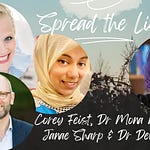
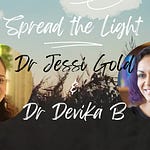

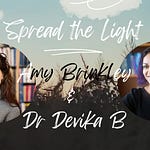
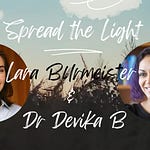

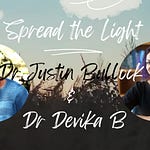
Spread the light: Dr Ahmed Hankir's journey with melancholia and elation in medicine